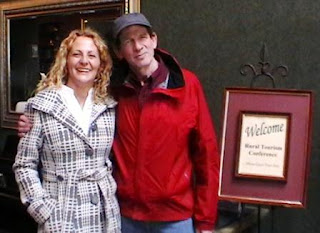
Yesterday I was contacted by someone from the National Trust for Historic Preservation in Washington, DC to bring to my attention a special issue of the Forum Journal (Winter 2010) that focused on Heritage-Based Rural Development.
BC has an active Heritage Branch in the Ministry of Tourism, Culture and the Arts and I have had the good fortune to work with many of their staff in the past. Efforts to bring together those in heritage preservation and tourism have been made in recent years as there is a growing recognition of the synergies that can happen when working together. Sometimes when blending people from different worlds – it is a good idea to focus first on common goals. I would like to propose in this blog, that those working on heritage tourism think a bit broader about how heritage can support rural development in general – not just through tourism. By following the suggestions and examples in the articles discussed above, the protection and promotion of heritage assets leads to the goals of many rural areas. For example heritage assets make communities more attractive to visitors, residents and businesses which can keep people in the community. It also invests in foundations of authenticity which can create places where people experience a “sense of place” (which is becoming difficult as all our cities begin to look alike).
So how do the journal articles suggest this happens – well I don't want to take away from your enjoyment in reading the articles – but here are a few highlights I gleaned. Based on two pilot projects (regional based) along the Mississippi River in Arkansas and in central Kentucky – James Lindberg’s article provides six principles for heritage based development including:
1. Use a regional approach
2. Protect historic authenticity
3. Nurture grassroots involvement and leadership
4. Forge strong partnerships
5. Be flexible, and
6. Make a long term commitment
Using these as guiding principles – they also propose six strategies for moving forward. I thought these were particularly useful for rural development:
1. Educate about the value of rural heritage
2. Conserve heritage assets
3. Encourage local entrepreneurship and the use of historic structures
4. Develop heritage tourism potential
5. Brand and market your regional identity
6. Advocate for public policies that support heritage-based rural development
2. Conserve heritage assets
3. Encourage local entrepreneurship and the use of historic structures
4. Develop heritage tourism potential
5. Brand and market your regional identity
6. Advocate for public policies that support heritage-based rural development
So without spoiling your read, go and review the articles (they are short) as they point out many tips under each strategy. I couldn’t help but think about the many examples of heritage resources in BC that I have visited over the years that are in dire need of conservation before they can be of any use for tourism. Many rural residents are aware of these assets and value the sites, places and people that have established roots to the area. The state of many sites however is unfortunate – old buildings crumbling or being demolished for new developments. Once they are gone, and once the people that are connected to these places are gone – these heritage resources will be much more difficult, if not impossible to revitalize.
Canadians often say that Canada doesn’t have its own culture (which I adamantly disagree with). Perhaps it is time we learn from others – even within our own country (i.e. Quebec efforts around heritage preservation are excellent) about what our heritage amenities are and then prioritize them as key ingredients for rural development. We know they are there, and we should know by now the roadblocks that are preventing them from being restored and utilized – so now all we need are creative ideas on how to get there (which starts with being a priority). With so much emphasis on “tourism product development” going on, heritage resources must be incorporated into these discussions in ways that balance the mandates of protection and promotion.
I like to expose myself to the thinking and practices south of the 49th whenever I can. There is a collective understanding about rural tourism development in the USA that Canada can, and should, learn from. Universities have supported extension activity in tourism across the States for quite some time and clusters of active regions have demonstrated many promising practices. Luckily, I will get the opportunity for more interaction with folks by attending the Rural Tourism Conference in Mississippi October 25-27th. For others who want to attend a good conference on rural tourism, keep your eyes open for the next National Extension Tourism Conference as well.









